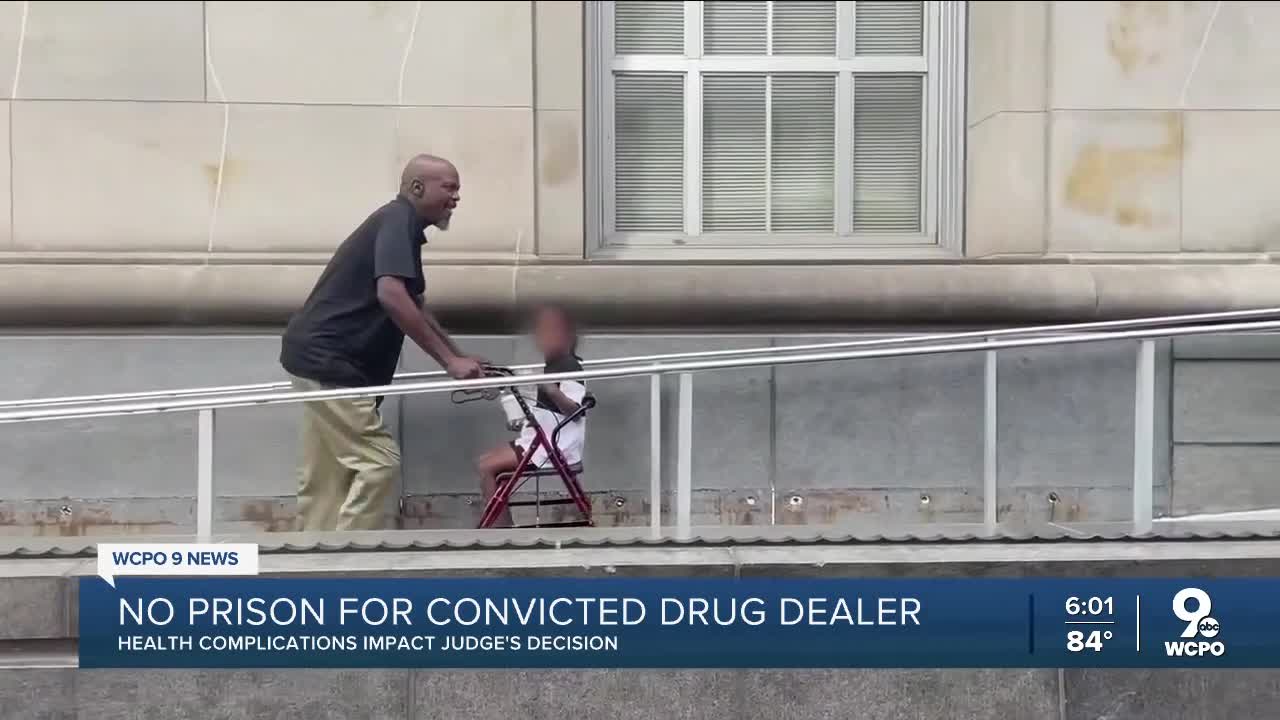CINCINNATI — A Cincinnati U.S. District Court judge sentenced a convicted Hamilton drug dealer Tuesday morning following years of pandemic delays, but that sentence didn't include prison time.
Judge Douglas Cole decided time served plus 10 years supervised release was appropriate for 61-year-old Jonathan Ingram given his poor health condition, a sentence both the U.S. Attorney's Office and defense requested.
Ingram suffers from end-stage renal disease and requires a kidney transplant. The court said he undergoes dialysis three times weekly, which leaves him in a constantly frail state. According to his sentencing memorandum, an expert estimates that, without a kidney transplant, Ingram’s life expectancy is around five years.
"I would call it the most humanitarian outcome," said Cincinnati criminal defense attorney Mark Krumbein, who is not involved in the case.
Ingram's weakened state was evident Tuesday when he walked into the Potter Stewart U.S. Courthouse with a walker. Though he stood alongside his defense attorney to address the judge once, Ingram sat for the remainder of his sentencing hearing.
The prosecutor described it as one of her most difficult cases and said that given the severity of the charges, Ingram would have faced years in prison.
Cole agreed, adding it was a frustrating case to judge.
Ingram stood to be sentenced on two separate federal indictments stemming from drug and illegal firearms charges in 2017 and 2019.
His 2017 arrest was part of a Hamilton drug bust in which the police chief described Ingram as a "major player" regarding Southwest Ohio drug suppliers.
Court documents show after his arrest Ingram was detained after pretrial when the magistrate judge determined he presented a danger to the community that could not be adequately mitigated by conditions. Not long after, however, Ingram was released pretrial to permit him to pursue a kidney transplant.
In 2019, Ingram "took advantage of his freedom" his sentencing memo said.
While on supervision, he was arrested again and a judge revoked his bond. A grand jury later returned a second indictment against Ingram charging him with possession of cocaine with intent to distribute, possession of a firearm by a prohibited person and possession of a firearm in furtherance of a drug trafficking offense.
"Normally that would be the death blow in his sentence, having done that while he was out awaiting sentence on other charges," Krumbein said.
In February 2020, Ingram pleaded guilty under a plea agreement, securing him a sentencing range of 60 to 120 months. At the onset of the COVID-19 pandemic, Ingram was issued a temporary release on bond due to his "many health conditions."
In 2022, the prosecution and defense revisited the plea agreement, asking the court to permit Ingram to withdraw his guilty plea for an amended agreement that would allow for a sentence without incarceration.
Court documents state the parties made the request given Ingram's deteriorating health and dire need for a kidney transplant. The court granted the motion and Ingram entered the new plea for a new sentencing range of time served to 120 months.
"I'm sure this was a very difficult decision for Judge Cole," Krumbein said. "He did side on going against what he normally, what I'm sure what he would normally do, which would be incarceration but he has decided to give this man a break."
The courts say Ingram has been undergoing evaluation for a kidney transplant at the University of Cincinnati Medical Center and his 22-year-old granddaughter has volunteered to be his donor.
But both the defense and prosecution argued Ingram would not be considered for the procedure if he were sentenced to prison because it requires lifelong, extensive after-care.
"Although the Bureau of Prisons will, of course, also evaluate Ingram for a transplant, there is reason to believe that the process may be substantially delayed compared to the hospital with which Ingram has already been working — and that such a delay may exceed his life expectancy," Ingram's sentencing memo says.
Ingram's defense attorney asked Cole: Do his crimes warrant a death sentence? Cole ultimately decided they didn't.
"This is a very merciful suggestion or agreement by the U.S. Attorney's Office to try and save this man's life even though he did almost everything possible to mess it up," Krumbein said. "Really Judge Cole will be saving this man's life."
Cole decided the first 180 days of Ingram's 10-year supervised release will be a parole-issued curfew with localized monitoring. That's assuming Ingram will stay on track with his pursuit for a kidney transplant.
Cole requested the prosecution and defense reconvene at the end of that period to discuss changes to Ingram's supervised release. Under his sentencing conditions, the Court would be allowed to impose a two-year term of imprisonment for any violation.





